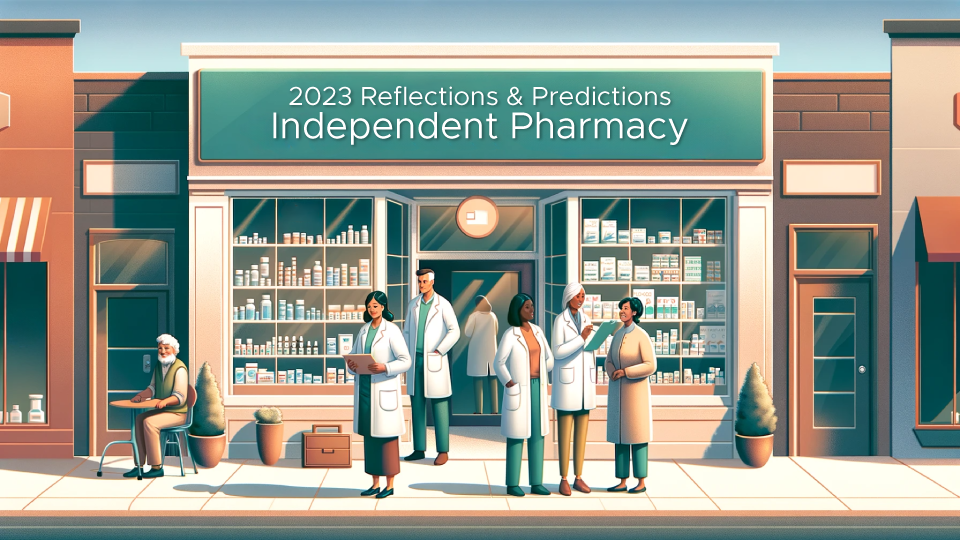In today’s fast-paced and technologically driven world, the landscape of healthcare, particularly pharmacy services, is rapidly changing. Over the last year, we have seen a number of shifts in patient, provider, payer, and regulatory expectations placed on independent pharmacy. As 2023 comes to a close and we prepare for 2024, the Scriptly team recently took the time to reflect on changes we’ve seen this year and predict the shifts we may see next year.
Reflection: The Lasting Impacts of COVID
Even as the public health emergency ended in May, COVID has had an undeniable impact on every aspect of life and pharmacy is no exception. We saw pharmacies constructing separate areas of the store or even outside the store for COVID testing, barriers constructed at the checkout counter, and fundamental shifts in the filling process itself to accommodate social distancing. Some of these impacts were short-lived, but others are here to stay. Online prescription management, prescription delivery, and the expansion of pharmacist counseling to a variety of modes, including video calls, are just a few of the lasting impacts of COVID that independent pharmacy owners now find themselves looking for sustainable solutions to.
Prediction: The Evolving Technology Landscape
Many independent pharmacy owners continue to struggle with the solutions they put into place in the thick of COVID. We’ve seen pharmacies using their pharmacy management system, an online checkout platform, a shipping platform, a customer relationship management program, and a phone system all from different vendors. As we settle into the new normal in a post-COVID world, we’ll start to see these independent pharmacies unraveling the complex systems they created during the pandemic. The Scriptly team is excited to help customers find new efficiencies in how they navigate these new responsibilities.
Reflection: The Return of On-Site Audits
Another change that pharmacies saw in 2023 was the return of on-site audits from Pharmacy Benefit Managers (PBMs). While audits were certainly happening over the last few years, there is a higher level of urgency with on-site audits as the auditor is not going to wait the 7 to 30 days that pharmacies are allowed for a remote audit. Instead, pharmacies have just minutes to gather this documentation. Audits may require several documents for every single prescription. Gathering these documents is especially disruptive when doing so conflicts with patients waiting for their medications. They are also difficult when they request new types of documents. For example, a delivery confirmation for a pharmacy that was not doing any shipping pre-COVID.
Prediction: Automated Audit Response
Filing systems for paperwork, whether physical or electronic, can only take a pharmacy so far. As requests from PBMs for documents evolve, it is difficult to backfill all of the prescriptions that are currently filed. Pharmacies simply do not have time to amend all of their previously filed prescriptions. Instead, they are pulling these new documents at the time of the audit, increasing both audit response time and impact to waiting patients.
Scriptly has developed a novel solution for managing both virtual and on-site audits, including document gathering. The system is constantly gathering documentation for every prescription both from internal sources and external sources. At the time of the audit, a pharmacy technician needs only to type or scan in the prescription number provided by the auditor. The system will automatically retrieve all of the relevant documents for that prescription. This audit tracking functionality saves pharmacy staff, auditors, and patients time. We anticipate that these types of automation will increase in 2024.
Closely Watching: Artificial Intelligence
2023 saw an explosion of both the capabilities and availability of Artificial Intelligence. As we look towards 2024, this is an area that the Scriptly team is keeping a very close eye on. It is critical that AI be exercised in the healthcare industry with great discretion. While we are very excited about the possibilities that AI brings, concerns around patient privacy, accuracy, and cost still pose large barriers to bringing large language models into healthcare for the foreseeable future. We have a great solution in the works that uses AI to prevent errors and protect against audit clawbacks. More on that in 2024.

